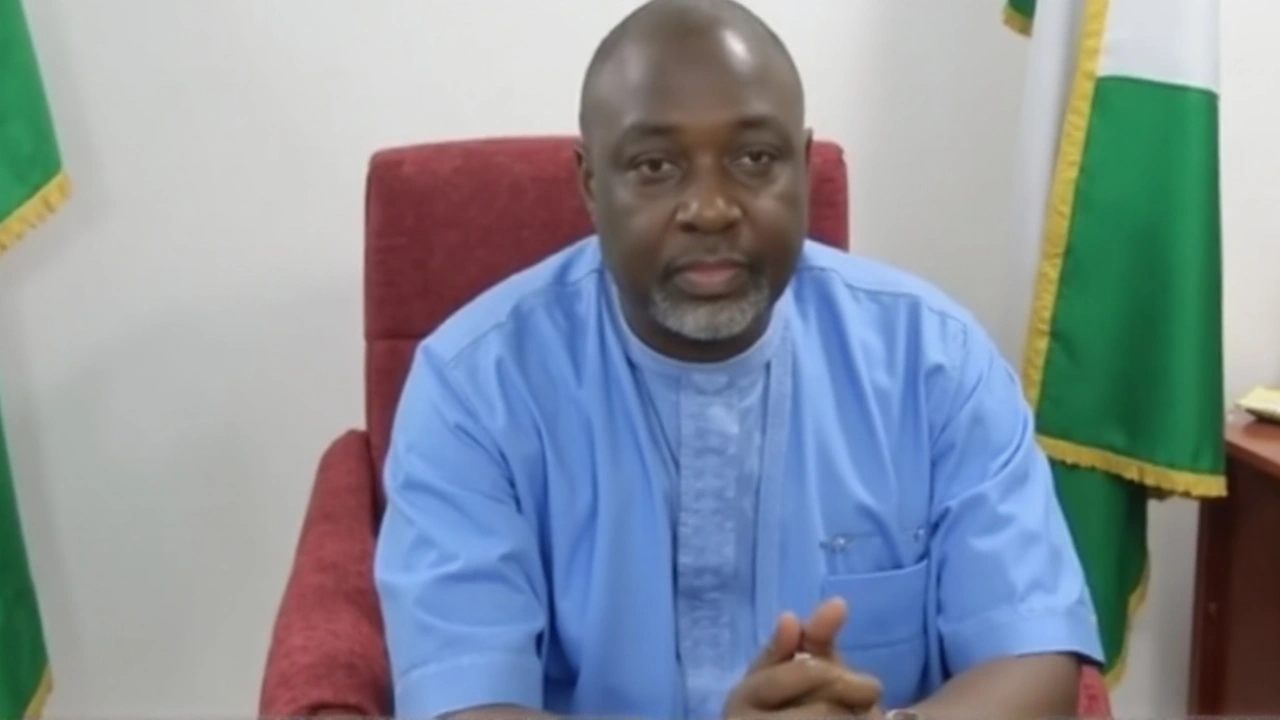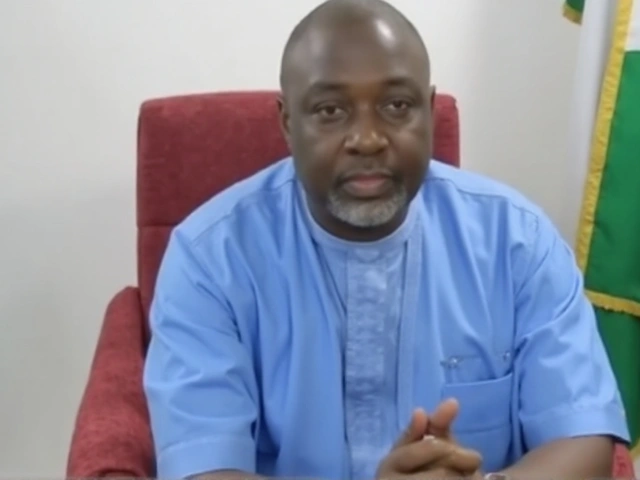A new opposition push has lit a fire under Nigeria’s political class: a bloc featuring Atiku Abubakar, Peter Obi, David Mark, Nasir El-Rufai, Rotimi Amaechi, and Dele Momodu says it has adopted the ADC as its platform and named Mark interim national chairman. Dumebi Kachikwu, the party’s 2023 presidential candidate, is not buying it. He calls the move illegitimate and urges the coalition to join properly or move on.
What triggered the ADC takeover fight
The spark came from a midweek meeting in Abuja where a cross-party coalition of heavyweights declared the African Democratic Congress their new umbrella. They went further: David Mark, a former Senate President, was announced as interim national chairman, with former Osun State Governor Rauf Aregbesola as interim secretary. The message was clear—build a mega opposition vehicle early, ahead of 2027.
Kachikwu’s response was swift and sharp. In a statement titled, “Re: David Mark appointed as ADC interim chairman – My Response,” he questioned the legal foundation of the coalition’s move. His main target was the coalition’s reported alliance with Ralph Nwosu, the party figure they are leaning on. According to Kachikwu, Nwosu’s tenure ended on August 21, 2022, and what followed were court cases in different parts of the country challenging his continued claim to leadership.
“The tenure of the Nwosu-led executive lapsed on August 21, 2022,” Kachikwu said, arguing that anyone trying to hijack the party through expired mandates or backroom deals would face resistance. He framed the ADC as a rules-first organization: “We are a party of decent and well-behaved people. Our brand of opposition is one that not only opposes but proposes.” And then the parting shot: the coalition will soon be shopping for another party, he said, wishing them “Bon Voyage.”
He is not alone in pushing back. A group of existing ADC members has also rejected the claim that the coalition has adopted the party, stressing that the ADC is not a one-man project and cannot be seized by fiat. That internal resistance matters because even a willing handshake with some leaders does not guarantee full control of an established party structure spread across state chapters.
So what does it take to “take over” a party in Nigeria? It is not a press conference and a title. Party constitutions set the process for leadership changes and alliances. National conventions and congresses must be called properly, and Nigeria’s Electoral Act requires parties to notify the electoral commission before such meetings. In simple terms: paperwork, procedure, and a lot of votes inside the party. As of now, there is no public evidence that these steps have been completed for this new arrangement, and no formal response from the coalition detailing how they plan to meet these requirements.
There is also the legal fog. Leadership disputes in Nigerian parties often end up in court, and parallel court orders are common. If this coalition persists with the ADC route, it will likely face both procedural hurdles and litigation from factions that feel sidelined. That is before state chapters weigh in, which they will.
Why choose the ADC at all? Two reasons. First, it is already on the political map with a national spread, which saves time versus registering a new party. Second, the playing field for new parties is tighter than it used to be. The electoral commission deregistered dozens of parties in 2020, and while new parties can still emerge, the bar is higher. Using an existing vehicle is the quickest way to get on the ballot everywhere.
But speed is not the only issue. Legitimacy matters to voters and to the courts. If the coalition wants to present itself as a credible alternative government in waiting, it will need a story that goes beyond a room in Abuja: open processes, clear rules, and transparency about who is in charge—and why.
The 2027 stakes and what could happen next
This is bigger than a squabble over titles. The move signals an early attempt to avoid the 2023 problem: a split opposition. At the last presidential race, the opposition field was fractured, and that helped the ruling party keep the presidency. A united front—if it can be built—changes the math for 2027.
The cast here is unusual. Atiku Abubakar and Peter Obi were rival presidential candidates last cycle. El-Rufai and Amaechi are powerful figures from the ruling party camp. David Mark brings parliamentary heft. On paper, this is a wide tent with name recognition across regions. But politics is not just arithmetic; it is chemistry. Can these leaders co-exist long enough to make hard trade-offs on ticket sharing, policy priorities, and party control? That is the real test.
The coalition’s choice of the ADC suggests three possible strategies:
- Control the party from the top by installing interim leaders, then consolidate through a convention that ratifies the changes and ushers in joint structures across states.
- Use the ADC as a temporary platform to coordinate activities while a more formal merger or alliance is negotiated among larger parties and blocs.
- Apply pressure on other opposition parties by showing momentum, nudging them into a broader pact that could culminate in a new alignment later in the cycle.
Each option has friction points. Installing interim leaders without airtight legal backing invites court injunctions and parallel congresses. Using a party as a placeholder can quickly look cynical if ordinary members feel ignored. And building a broad pact requires compromises on candidate selection that rarely come cheap.
Inside the ADC, the next few weeks are crucial. If the coalition wants to make this stick, it will need to win over national officers and state chairs, not just national figures with name recognition. It will also need to set out a transition plan that fits the party’s constitution—committees, congresses, and timelines—then notify the electoral commission properly. Anything short of that becomes a public-relations play, not a functional takeover.
Kachikwu’s challenge is more than personal irritation. It is a tactical warning: if the coalition skips steps, the project will stall in court and on the ground. He has also planted doubts about endurance—suggesting the coalition will soon shop for another platform. That jab hits a sensitive nerve. In Nigerian politics, big names often circle multiple parties over short periods. Voters notice.
What are the coalition’s options if the ADC path becomes too messy? They could shift focus to a formal alliance across parties without forcing a takeover—think of coordinated candidates and joint campaign infrastructure rather than one party swallowing another. They could also seek to build a new movement and negotiate with multiple smaller parties for ballot access while keeping their legal identities. None of this is as clean as a single party, but it can work if the message is strong and the structure is disciplined.
There is historical precedent for sweeping realignments. The current ruling party was born in 2013 from a merger of opposition blocs that aligned ahead of the 2015 elections. Those deals involved intense negotiations, clear power-sharing formulas, and a long runway to organize across the states. If the new coalition wants to replicate that kind of success, it needs the same discipline and patience—plus a plan to manage egos and legal landmines.
Two signs will show whether this is serious or just theater. First: paperwork. If we see proper notices for congresses, court filings that hold up, and clear communication from party organs, the coalition is doing the work. Second: grassroots buy-in. If state chapters begin to align with the announced leadership and we see joint structures forming outside Abuja, then something real is taking shape.
For now, the ADC is in the eye of the storm. Coalition leaders want a ready-made platform; current party figures warn that rules still matter. Nigeria’s opposition voters are watching for a simple answer: can these politicians put their rivalries aside and build a credible, legal, and stable vehicle in time for 2027? The next moves—on paper and on the ground—will tell.



Someone claims a party takeover and everyone starts screaming
No paperwork, no votes, just a press release and a title
Foreign interests love watching Nigerian elites fight over broken institutions
Real change happens when the people rise, not when politicians swap party logos
The Electoral Act mandates notification to INEC prior to any leadership transition
Furthermore, Section 87(1) of the 2022 Electoral Act explicitly requires a duly convened national convention
None of these conditions have been satisfied
Thus, the coalition's claim is not merely illegitimate-it is legally void ab initio
And the reference to Nwosu's expired tenure? That's not a footnote-it's the entire foundation of the challenge
Anyone who takes this seriously without reviewing the party constitution is either willfully ignorant or complicit
So many brilliant minds, so much potential... and they're still playing musical chairs with party names?
When will we stop treating democracy like a game of Monopoly?
Every election cycle some big names get bored and decide to ‘unite’ the opposition
They hold a meeting in Abuja, slap a title on someone, tweet a press release, and then vanish by the next year
They don’t care about the party structure, the state chapters, the members who actually pay dues
They just want to be the face of the big coalition so they can get media time and donor money
And then when it collapses-which it always does-they blame ‘the system’
Meanwhile, real grassroots organizers are still stuck in Kaduna or Oyo trying to register voters while these guys are on CNN
And the kicker? They always pick the ADC because it’s the only party with a decent name and no real money behind it
So they think they can just walk in and take it
But the party’s got 17 state chairmen who never got invited to that meeting
And they’ve got lawyers who’ve been waiting for this exact moment to sue
So yeah, good luck with that
By 2025 this will be a meme called ‘ADC Takeover 2024: The Ghost Party’
They think they’re being smart by picking ADC because it’s ‘already on the map’?
Bro, the ADC is the party where the last chairman got kicked out for sending campaign flyers with his face on them and calling it ‘God’s chosen vehicle’
They’re not taking over a party-they’re taking over a haunted house with bad Wi-Fi
Like, imagine if they actually built something real instead of just naming chairs
But then again, maybe the chaos is the point
Because if things ever got too organized, someone might actually have to listen to the people
Even if the method is flawed, the goal matters
Maybe we need to give them space to fix it, not just tear it down
Because if you tried to take over a company like this without HR, legal, or board approval-you’d be fired on day one
Yet in politics? You get a press conference and a title
But if they want to win, they need to build, not steal